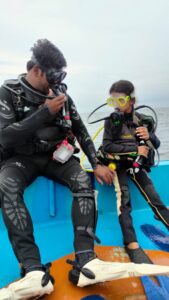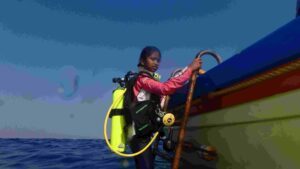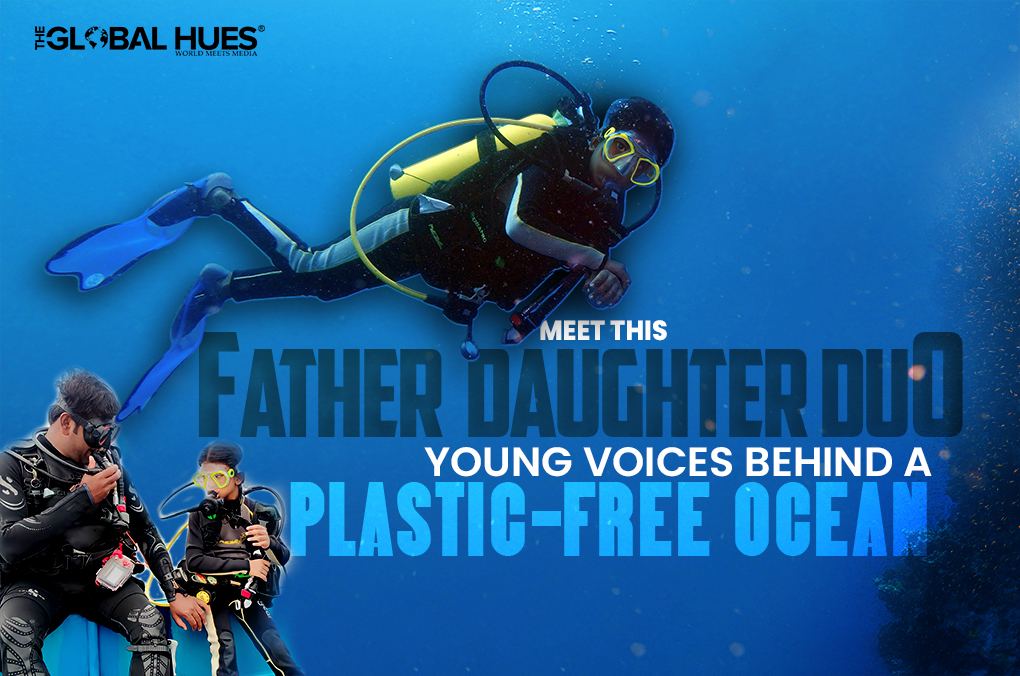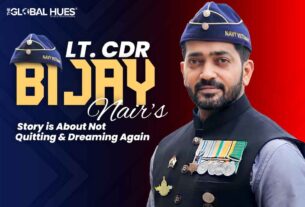World Ocean Day celebrated on June 8th each year, isn’t just another date on the calendar. This day is a reminder to all the people living on this planet to realise and appreciate the contribution of oceans in our lives. But what are we doing in reality? We are adding 8 million to 10 million tonnes of plastic waste into the ocean each year. To put it into perspective, if you spread this waste as thin as a plastic bag, it is enough to cover an area of 11,000 sq km (4,250sq miles). That’s about the size of small countries like Jamaica, Bahamas or Qatar. Thankfully, some people on planet Earth are trying their best to undo the adversities. A father-daughter duo Aravind Tharunsri and Thaaragai Aarathana are on a mission to clean up our oceans. While Aravind is a dive instructor, Thaaragai is just 9 years old and has been following her father’s footsteps since she was 5 years old.
Let’s connect with Aravind and little Thaaragai to understand their inspiring mission.
1. How did Thaaragai become interested in marine conservation at such a young age? What inspired her to get involved?

Aravind: As a dive instructor, I am into teaching and marine conservation, particularly working for dugongs, turtles, whales, sharks and other endangered species. I take Thaaragai with me whenever and wherever I go. She closely observes my work, community engagement and public awareness discussions. I also take her with me in my underwater clean-up dives. Due to these activities, she has developed a strong interest in marine conservation. To date, she has completed 45 dives and given over 70 community talks. She has collected more than 1000 kg of plastic waste from scuba diving.
2. What are your long-term goals for your marine conservation initiative? How do you envision the future impact of your work?
Aravind: I believe that it’s very difficult to change the current generation, therefore I am focusing on teaching the next generation. I strongly believe that if we educate them properly about the importance of environmental preservation, our ecosystems, marine life, climate change, and our planet, we can prepare them to make informed decisions in high-ranking positions, such as in politics, law enforcement, forestry, environmental departments, and more.
These future leaders can play a pivotal role in reducing plastic production, controlling industrial waste, halting deforestation, and much more. Simultaneously, we must also work on rectifying the mistakes of the past.
3. Did you face any challenges while initiating this mission?

Aravind: Currently, we are conducting weekly clean-ups to remove plastic waste from the shore and bottom of the ocean. When my daughter and I used to clean our streets, people used to tease and laugh at us. But gradually people have understood the importance attached to it. Now, many kids of my friends have joined Thaaragai; they are 30 in total.
We’re not doing this for awards or media attention but a small reward like a piece of chocolate can serve as a motivation to my daughter. We don’t wait for specific days like “World Environment Day” or “World Ocean Day.” We clean every day, whenever possible because every day is an opportunity to make a difference.
4. How do you feel when you see the positive impact you’re making on the environment and marine animals?
Thaaragai: I dive with my dad when he goes for clean-ups. I feel sad when I see marine life stuck in ghost nets and consuming plastics. I, with my dad’s help, free these marine creatures from the nets and remove plastic waste.
I’ve even had the opportunity to release two turtles trapped in floating nets and two more during our dives. One of the turtles had both its legs fully cut, making it unable to swim. It’s disheartening to see these creatures suffering because of humans but there are moments when I feel proud that we are doing something truly special.
5. What do you dream of achieving in the future when it comes to marine conservation?
Thaaragai: I want to bring change among kids of my age. I am doing a lot of community talks, and college & school talks to spread awareness about plastic pollution and marine conservation. I understand that I alone cannot bring about this change; it’s the responsibility of every individual.
We are making progress, but change takes time. It happens slowly, one person at a time. We all can start by making our homes plastic-free, then cleaning our streets, followed by the streets in the neighbourhood, roads, and nearby water bodies. Eventually, we can work our way to the beach shore and oceans. If we all follow these steps, conservation becomes a natural part of our lives.
Read More Inspiring Stories:
- Mukta Singh: Breaking Stereotypes Of Modeling At The Age Of 58
- Meet 68-Year-Old Doctor-Model Who Is An Inspiration To Many
- Mission Milk: Helping Underprivileged Children In Times Of Hardship
- Echoes: A Cafe That Converses Without Any Language
- Lt. Cdr Bijay Nair’s Story Is About Not Quitting & Dreaming Again




